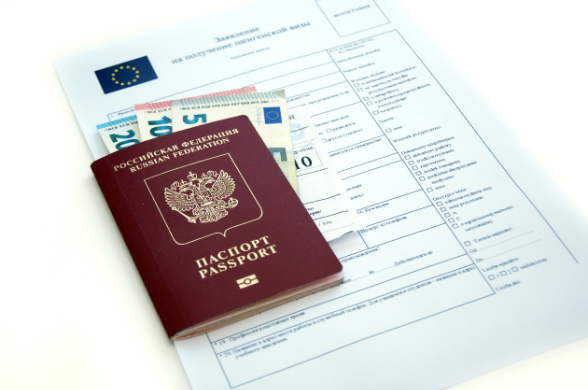Overstayed your 90 day limit in Spain?
EXPLAINED: What happens if you overstay your 90 day limit in Spain?
Visitors to Spain from non-EU countries are subject to the 90-day rule, which states that they can only stay for 90 days out of 180. But how strictly is this rule enforced - and what happens if you end up overstaying?
For all non-EU citizens – which from January 2021 includes UK nationals – the 90-day rule puts limits on how long you can stay in Spain within a 180-day period.
The rule applies to non-EU nationals who need a visitor visa to enter Spain, such as Indian, Chinese or Russian nationals, and those who don’t need a visa, such as visitors from Israel, Canada, the United States, Canada or the UK.

The rule limits time spent in the Schengen zone (which Spain is a part of) to 90 days out of the last 180.
People who want to stay longer than 90 days in every 180 in Spain must get a long-stay visa which grants them residency status for a period of time based on work, research, study, having sufficient income to cover your expenses and more.
Some of these visas include the non-lucrative visa, the golden visa, the student visa, the entrepreneur visa or the employment visa.
Without one of these, surpassing the 90-day limit means you’re overstaying.
What consequences are there for overstayers?
If you spend more than 90 days in the EU or Schengen zone without a visa or residency permit then you have officially overstayed.
And unlike the days when border control was simply a guard with a stamp, modern technology means that most passports are scanned by a Spanish border guard on both entry to and exit from the EU – making it obvious who has overstayed their welcome and impossible to slip through the cracks.

This is set to become even more stringent when the EES scheme comes into effect next year ….
Officially speaking, the EU has a range of possible penalties for overstayers at its disposal, although in practice some countries are stricter than others. Fortunately, Spain has historically been one of the more lenient member states when it comes to punishments and penalties, and showed flexibility with dates during the COVID-19 pandemic.
But technically speaking, anyone who overstays the 90-day rule in an EU country can, in theory, be subject to the following penalties:
Deportation – if you overstay, EU countries are within their rights to deport you, or give you a certain number of days to leave. In practice, deportation is rare for people who aren’t working or claiming benefits: instead they are more likely to be advised of the situation and told to leave as soon as possible.
Fines – fines can be levied in addition to other penalties and vary according to country.
Prison sentences – in extremely rare cases, people who overstay their visas can face up to a year in prison. However, aggravating factors like working for several months or committing a criminal offence while in the country would likely be involved.
Entry ban – EU countries can impose a complete ban on re-entry, usually for three years although it could be longer. A complete ban is usually only put in place for people who have over-stayed for a significant amount of time or broken the law while overstaying.
What are the consequences of overstaying 90 days in Spain?
Though the above rules and punishments are EU-wide, each member state has the autonomy to enforce them at their own discretion.
So, what about Spain?
Looking at Spain specifically, Spain’s foreign ministry doesn’t explicitly mention what the consequences of overstaying in this FAQ or its state bulletin. Yet, fines and temporary bans are mentioned in various places online, without many specifics.
According to article 53.1.a of Spain’s Immigration Bill, overstaying the 90-day limit could be considered a serious violation in the eyes of the law.
Possible fines can range from €501 all the way up to €10,000, expulsion from Spain is possible, as is a potential ban from the Schengen area for six months to five years.
The major fines, expulsions and bans are for serious offences and overstays. Minor wrongdoings and accidental overstays can result in fines under €501, while serious breaches can lead to penalties of €10,000 to €100,000.
A 2021 report in Legal Today states that in recent years Spanish courts have tended to favour fining foreigners or even giving them a jail sentence, rather than expelling them.
The Spanish government has stated that overstayers can be deported or fined, but not both.
Spanish flexibility?
A Spanish state bulletin during the COVID-19 pandemic dealing with overstays of third-country nationals did create a brief three-month grace period during the state of alarm, and due to this flexibility there is less reason to think that any of the harsher penalties would be applicable if other, reasonable and justified reasons are given for not sticking to the 90-day limit deadline moving forward.
Though this pandemic grace period is now no longer in force, there are exceptions in cases of unforeseen events. Spain does offer visa extensions to third-country nationals in the event of illness or an accident.
In fact, for non-EU nationals like Americans and Australians, Spain has earned itself a reputation for being relatively relaxed about the exact exit date of people who aren’t working or claiming benefits in Spain as long as it’s within a few days.
To play it safe, if you’re not planning on applying for residency in Spain you should book your flight out long before the end of your 90-day stay in order to allow yourself some leeway in the event of cancelled flights.
Contrary to what scaremongering British tabloids have reported, it is unlikely that Spanish police will be deployed to hunt out overstayers and deport them.
How can I avoid overstaying my 90 days in Spain?
One of the best ways to avoid an accidental overstay is to understand the Schengen rules. It’s worth remembering, for example, that the date you arrive counts as the first day of your stay, even if your flight lands just before midnight. The same goes for the date you leave: anytime after midnight counts as the next day, even if it’s in the early hours of the morning.
If you’re planning to make multiple shorter trips or holidays in a 180-day period, you can use this handy calculator to work out how many more days you are allowed to stay.
Of course, if the last couple of years have taught us anything it’s that events can change everything. The Spanish government showed flexibility during the pandemic, as they have throughout the post-Brexit transition for Britons living in Spain. If unforeseen events dictate that you must stay longer than the permitted 90 days, it is unlikely you would receive a serious punishment so long as you are upfront about the situation.
Generally speaking, Spain has reputation for being less strict on exact coming and going dates, so long as you aren’t working, claiming benefits, or doing anything illegal.
It must not be forgotten, however, that Spain – as with all EU member states – is perfectly within its rights to punish you for deliberately overstaying your 90 days within the 180-day period. Though rare, doing so can be seen a serious breach of the law and punishable by fines, expulsion, or even a prison sentence.











